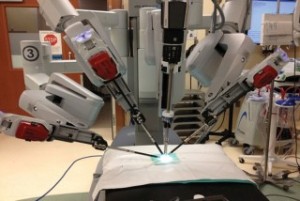Sep 29 2014
A new standardized assessment provides a useful tool for tracking surgeons' progress as they develop the skills needed to perform robot-assisted microsurgery, reports a study in the October issue of Plastic and Reconstructive Surgery®, the official medical journal of the American Society of Plastic Surgeons (ASPS).

"The Structured Assessment of Robotic Microsurgical Skills (SARMS) is the first validated instrument for assessing robotic microsurgical skills," according to the report by ASPS Member Surgeon Dr Jesse C. Selber of the University of Texas MD Anderson Cancer Center, Houston. Initial assessments using the SARMS show that, after a steep initial learning curve, surgical trainees display steady improvement in their ability to perform robot-assisted microsurgery tasks.
SARMS Tracks Development of Robotic Microsurgery Skills
The researchers describe the development and testing of the SARMS as a standard technique for evaluating technical skills for robot-assisted microsurgery. The SARMS consisted of 11 items—six evaluating microsurgery skills and five evaluating robotic skills.
After the SARMS was validated, expert surgeons used it to grade videos of surgical trainees performing robot-assisted microvascular anastomoses—joining and suturing tiny artificial blood vessels, just three millimeters in diameter. Each of nine trainees was graded on five videos, made as they gained experience with the robotic surgical system. Changes in scores in each area were assessed, along with the time required to complete the procedure.
The SARMS scores documented general improvement in microsurgical skills with each practice session. On a five-point scale—from "novice" to "expert"—the trainees' average ratings of overall skill and performance increased from around two to around four.
"The results showed an initial steep ascent in technical skill acquisition, followed by more gradual improvement," Dr Selber and coauthors write. Across the five sessions, average operative time decreased gradually, from about 30 to 19 minutes.
Previous experience performing conventional microsurgery—under the operating microscope, but without robotic assistance—was the main factor affecting the trainees' skill level. The SARMS items showed good to excellent consistency among the different expert raters.
Tool Will Aid Training in Robot-Assisted Plastic Surgery
Surgical robots have emerged as a potentially valuable tool in many surgical disciplines, including plastic and reconstructive surgery. By eliminating tremor of the surgeon's hand and scaling hand motion, surgical robots are capable of "superhuman precision"—expanding the ability to perform delicate microvascular manipulations that would be all but impossible with the unaided human hand.
The SARMS score developed and evaluated in this study provides a new, standardized tool for evaluating trainees' skill and performance as they gain experience with robotic microvascular surgery. The results suggest that surgical trainees can expect a tough going at first, but show gradual improvement in skills and shorter procedure times over as little as five practice sessions.
"Standardized evaluation and systematic learning of both robotic and conventional surgical techniques is necessary, and is the foundation of competency-based training, which itself is the future of surgical education," Dr Selber and coauthors conclude. Dr Selber will give a special "Tech Talk" on the topic of Robotics at "Plastic Surgery—The Meeting," the annual scientific meeting of the ASPS, to be held October 10-14, 2015 in Chicago, Ill.
Click here to read "Robotic Microsurgery: Validating an Assessment Tool and Plotting the Learning Curve."
Plastic and Reconstructive Surgery® is published by Lippincott Williams & Wilkins, part of Wolters Kluwer Health.
About Plastic and Reconstructive Surgery
For more than 60 years, Plastic and Reconstructive Surgery® (http://journals.lww.com/plasreconsurg/) has been the one consistently excellent reference for every specialist who uses plastic surgery techniques or works in conjunction with a plastic surgeon. The official journal of the American Society of Plastic Surgeons, Plastic and Reconstructive Surgery® brings subscribers up-to-the-minute reports on the latest techniques and follow-up for all areas of plastic and reconstructive surgery, including breast reconstruction, experimental studies, maxillofacial reconstruction, hand and microsurgery, burn repair, and cosmetic surgery, as well as news on medico-legal issues.
About ASPS
The American Society of Plastic Surgeons (ASPS) is the world's largest organization of board-certified plastic surgeons. Representing more than 7,000 Member Surgeons, the Society is recognized as a leading authority and information source on aesthetic and reconstructive plastic surgery. ASPS comprises more than 94 percent of all board-certified plastic surgeons in the United States. Founded in 1931, the Society represents physicians certified by The American Board of Plastic Surgery or The Royal College of Physicians and Surgeons of Canada. ASPS advances quality care to plastic surgery patients by encouraging high standards of training, ethics, physician practice and research in plastic surgery. You can learn more and visit the American Society of Plastic Surgeons at www.plasticsurgery.org or www.facebook.com/PlasticSurgeryASPS and www.twitter.com/ASPS_news.
About Wolters Kluwer Health
Wolters Kluwer Health is a leading global provider of information, business intelligence and point-of-care solutions for the healthcare industry. Serving more than 150 countries worldwide, clinicians rely on Wolters Kluwer Health’s market leading information-enabled tools and software solutions throughout their professional careers from training to research to practice. Major brands include Health Language®, Lexicomp®, Lippincott Williams & Wilkins, Medicom®, Medknow, Ovid®, Pharmacy OneSource®, ProVation® Medical and UpToDate®.
Wolters Kluwer Health is part of Wolters Kluwer, a market-leading global information services company. Wolters Kluwer had 2013 annual revenues of €3.6 billion ($4.7 billion), employs approximately 19,000 people worldwide, and maintains operations in over 40 countries across Europe, North America, Asia Pacific, and Latin America.maintains operations in over 40 countries across Europe, North America, Asia Pacific, and Latin America. Wolters Kluwer is headquartered in Alphen aan den Rijn, the Netherlands. Its shares are quoted on Euronext Amsterdam (WKL) and are included in the AEX and Euronext 100 indices. Wolters Kluwer has a sponsored Level 1 American Depositary Receipt program. The ADRs are traded on the over-the-counter market in the U.S. (WTKWY).